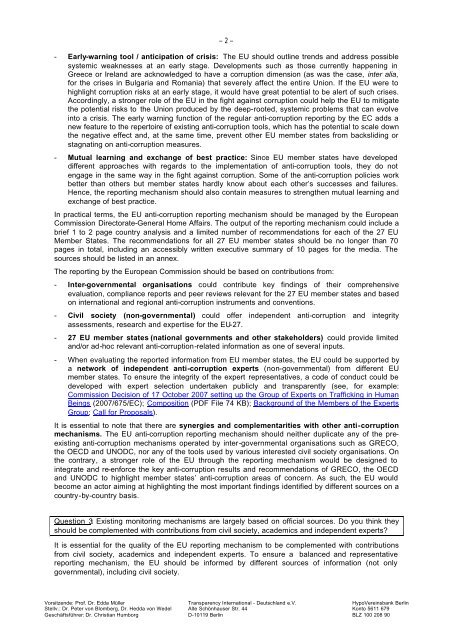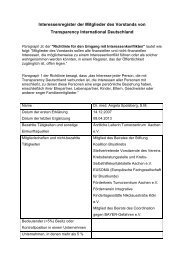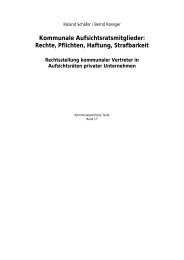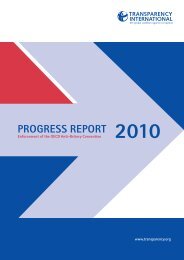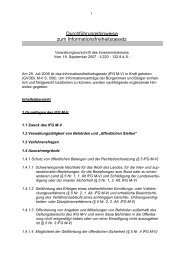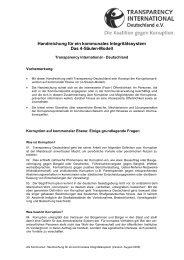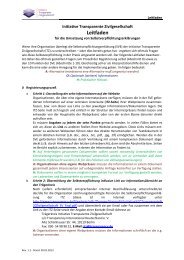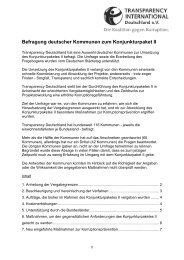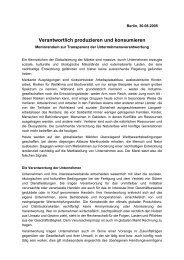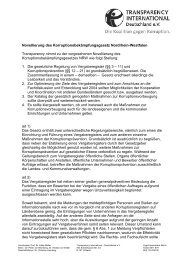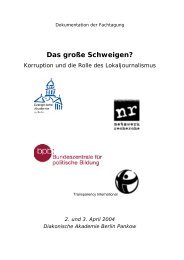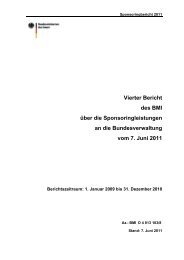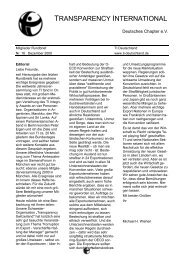Transparency International Germany - European Commission
Transparency International Germany - European Commission
Transparency International Germany - European Commission
You also want an ePaper? Increase the reach of your titles
YUMPU automatically turns print PDFs into web optimized ePapers that Google loves.
Vorsitzende: Prof. Dr. Edda Müller<br />
Stellv.: Dr. Peter von Blomberg, Dr. Hedda von Wedel<br />
Geschäftsführer: Dr. Christian Humborg<br />
– 2 –<br />
- Early-warning tool / anticipation of crisis: The EU should outline trends and address possible<br />
systemic weaknesses at an early stage. Developments such as those currently happening in<br />
Greece or Ireland are acknowledged to have a corruption dimension (as was the case, inter alia,<br />
for the crises in Bulgaria and Romania) that severely affect the entire Union. If the EU were to<br />
highlight corruption risks at an early stage, it would have great potential to be alert of such crises.<br />
Accordingly, a stronger role of the EU in the fight against corruption could help the EU to mitigate<br />
the potential risks to the Union produced by the deep-rooted, systemic problems that can evolve<br />
into a crisis. The early warning function of the regular anti-corruption reporting by the EC adds a<br />
new feature to the repertoire of existing anti-corruption tools, which has the potential to scale down<br />
the negative effect and, at the same time, prevent other EU member states from backsliding or<br />
stagnating on anti-corruption measures.<br />
- Mutual learning and exchange of best practice: Since EU member states have developed<br />
different approaches with regards to the implementation of anti-corruption tools, they do not<br />
engage in the same way in the fight against corruption. Some of the anti-corruption policies work<br />
better than others but member states hardly know about each other’s successes and failures.<br />
Hence, the reporting mechanism should also contain measures to strengthen mutual learning and<br />
exchange of best practice.<br />
In practical terms, the EU anti-corruption reporting mechanism should be managed by the <strong>European</strong><br />
<strong>Commission</strong> Directorate-General Home Affairs. The output of the reporting mechanism could include a<br />
brief 1 to 2 page country analysis and a limited number of recommendations for each of the 27 EU<br />
Member States. The recommendations for all 27 EU member states should be no longer than 70<br />
pages in total, including an accessibly written executive summary of 10 pages for the media. The<br />
sources should be listed in an annex.<br />
The reporting by the <strong>European</strong> <strong>Commission</strong> should be based on contributions from:<br />
- Inter-governmental organisations could contribute key findings of their comprehensive<br />
evaluation, compliance reports and peer reviews relevant for the 27 EU member states and based<br />
on international and regional anti-corruption instruments and conventions.<br />
- Civil society (non-governmental) could offer independent anti-corruption and integrity<br />
assessments, research and expertise for the EU-27.<br />
- 27 EU member states (national governments and other stakeholders) could provide limited<br />
and/or ad-hoc relevant anti-corruption-related information as one of several inputs.<br />
- When evaluating the reported information from EU member states, the EU could be supported by<br />
a network of independent anti-corruption experts (non-governmental) from different EU<br />
member states. To ensure the integrity of the expert representatives, a code of conduct could be<br />
developed with expert selection undertaken publicly and transparently (see, for example:<br />
<strong>Commission</strong> Decision of 17 October 2007 setting up the Group of Experts on Trafficking in Human<br />
Beings (2007/675/EC); Composition (PDF File 74 KB); Background of the Members of the Experts<br />
Group; Call for Proposals).<br />
It is essential to note that there are synergies and complementarities with other anti-corruption<br />
mechanisms. The EU anti-corruption reporting mechanism should neither duplicate any of the preexisting<br />
anti-corruption mechanisms operated by inter-governmental organisations such as GRECO,<br />
the OECD and UNODC, nor any of the tools used by various interested civil society organisations. On<br />
the contrary, a stronger role of the EU through the reporting mechanism would be designed to<br />
integrate and re-enforce the key anti-corruption results and recommendations of GRECO, the OECD<br />
and UNODC to highlight member states’ anti-corruption areas of concern. As such, the EU would<br />
become an actor aiming at highlighting the most important findings identified by different sources on a<br />
country-by-country basis.<br />
Question 3: Existing monitoring mechanisms are largely based on official sources. Do you think they<br />
should be complemented with contributions from civil society, academics and independent experts?<br />
It is essential for the quality of the EU reporting mechanism to be complemented with contributions<br />
from civil society, academics and independent experts. To ensure a balanced and representative<br />
reporting mechanism, the EU should be informed by different sources of information (not only<br />
governmental), including civil society.<br />
<strong>Transparency</strong> <strong>International</strong> - Deutschland e.V.<br />
Alte Schönhauser Str. 44<br />
D-10119 Berlin<br />
HypoVereinsbank Berlin<br />
Konto 5611 679<br />
BLZ 100 208 90


